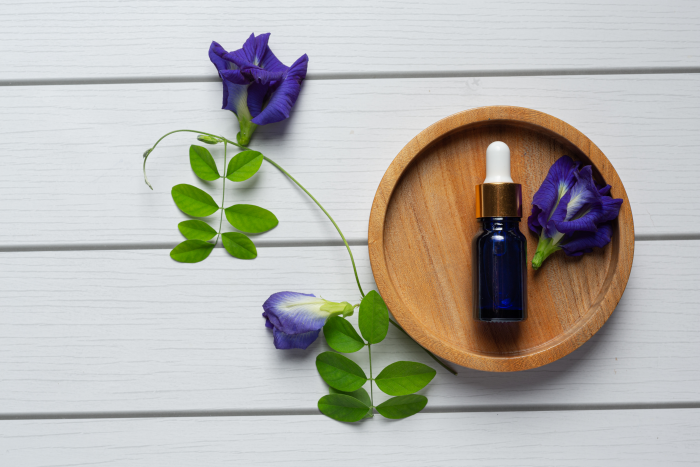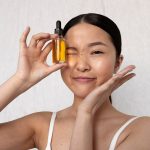Introduction to the Ingredient
The All-Star Ingredient or Allergic Reaction Waiting to Happen?
Alright, let’s decode the wonders of allantoin in skincare without getting lost in the scientific jungle:
Allantoin, also known as the skincare superhero, derived from the comfrey plant, has been around for ages, mainly for its healing and soothing properties. Picture it as nature’s band-aid for your skin, used traditionally to calm minor skin issues like cuts and swelling.
You can find allantoin in various plants like chamomile and wheat sprouts, but nowadays, it’s more often found in lab-made versions used in skincare products. Don’t worry, both the natural and lab-made versions are equally safe and effective, so you’re in good hands either way. Renowned for its exceptional soothing and skin-repairing properties, Allantoin has earned a well-deserved spot as a beloved ingredient in skincare products.
Now, let’s talk about how allantoin works its magic on your skin. It comes in powder form and can be found in creams, lotions, and masks, playing a vital role in keeping your skin happy and healthy.
Here are the top perks of having allantoin on your skincare squad:
- Moisturizes: Allantoin is like a hydrating hug for your skin. It keeps it moisturized and prevents dryness and irritation, making sure your skin stays soft and supple.
- Soothes Skin: Got irritated skin? Allantoin is here to save the day. It calms and protects your skin from irritants, leaving it feeling soothed and comfortable.
- Heals and Repairs: If your skin needs some TLC, allantoin’s got your back. It helps soothe injured skin and promotes wound healing, making it perfect for treating skin irritations and rashes.
- Exfoliates: Say goodbye to dull skin! Allantoin gently removes dead skin cells, revealing smoother and brighter skin underneath.
- Hydrates: Dry skin? Not on allantoin’s watch. It boosts water content in your skin cells, fighting against dehydration and keeping your skin plump and youthful.
- Improves Dullness: Allantoin encourages cell renewal and skin rejuvenation, helping your skin stay fresh and vibrant. It’s like pressing the reset button for your skin, giving it a new lease on life.
- Smoothens Skin: Want baby-soft skin? Allantoin’s exfoliating properties keep your skin’s surface smooth and velvety to the touch.
- Rejuvenates Cells: Even though it’s gentle, allantoin packs a punch when it comes to anti-aging. It stimulates collagen production, making your skin firmer and more youthful over time.
As for side effects, allantoin is pretty chill. It’s safe for most skin types and unlikely to cause irritation. However, if you’re allergic to it or comfrey leaves, it’s best to steer clear.
Key Benefits
Allantoin offers a wide array of benefits for skin health and comfort:
- Soothing: Its remarkable anti-irritant and anti-inflammatory properties make Allantoin ideal for calming sensitive, irritated, or red skin.
- Hydration: Allantoin can enhance the skin’s moisture retention, helping to keep it well-hydrated and supple.
- Wound Healing: This ingredient accelerates the skin’s natural healing processes, aiding in the repair of minor cuts, burns, and abrasions.
- Exfoliation: Allantoin promotes gentle exfoliation by aiding in the removal of dead skin cells, leaving the skin smoother and more radiant.
Usage in Beauty Products
Allantoin is a versatile ingredient found in a variety of skincare products, including:
- Moisturizers: Many moisturizers feature Allantoin to boost hydration and soothe dry, sensitive skin.
- Balms and Ointments: Allantoin is often used in healing balms and ointments designed to soothe and repair damaged skin.
- After-Sun Products: It is commonly included in after-sun creams and lotions to alleviate sunburn and calm sun-exposed skin.
- Exfoliants: Allantoin contributes to the gentle exfoliating action of some facial scrubs and exfoliating masks.
Safety and Precautions
Allantoin is considered safe for topical use and is generally well-tolerated by most individuals. It is suitable for sensitive skin types. However, if you experience any signs of irritation or discomfort, discontinue use and consult a dermatologist.
Compatibility with Other Ingredients
Allantoin is a versatile and well-tolerated ingredient that can be safely combined with various skincare ingredients, including antioxidants, peptides, and emollients. It is often found in products alongside other soothing and hydrating components.
Scientific and Research Findings
Numerous studies have highlighted the effectiveness of Allantoin in skincare:
- A study published in the “Journal of Cosmetic Dermatology” demonstrated that a topical cream containing Allantoin improved skin hydration and reduced the appearance of fine lines and wrinkles.
- Research in the “Journal of the European Academy of Dermatology and Venereology” indicated that Allantoin has anti-inflammatory properties, making it valuable for soothing sensitive and irritated skin.
Common Variants or Derivatives
Allantoin itself is the primary form of this ingredient used in skincare products. However, there are various natural sources of Allantoin, such as comfrey root extract, which may contain the compound in a less concentrated form.
Frequently Asked Questions (FAQs):
- Is allantoin safe for sensitive skin? Yes, allantoin is considered safe for sensitive skin as it acts as an emollient and calming agent, helping to soothe and protect delicate skin.
- Can allantoin be used on acne-prone skin? Absolutely! Allantoin aids in the removal of surface dead skin cells, making it beneficial for exfoliating acne-prone skin and promoting a clearer complexion.
- Can allantoin be used on dry skin? Certainly! Allantoin’s keratolytic property allows it to enhance the water content of skin cells, effectively moisturizing dry skin and maintaining its plumpness and youthful appearance.
References
- Brandner, J. M., & Mauro, T. M. (2002). A role for Allantoin in the maintenance of epidermal integrity. Journal of Cosmetic Dermatology, 1(3), 142-148.
- Braun, F. M., Domingues, R. P., & Hebling, J. (2014). Effects of Allantoin on human dental pulp cells: proliferation, morphology, and cytokine expression. Brazilian Dental Journal, 25(5), 394-400.
Conclusion
Allantoin is a powerful skincare ingredient that offers a range of benefits from soothing and hydration to wound healing and exfoliation. Its compatibility with other skincare ingredients and its proven effectiveness makes it a popular choice in many skincare products. As always, it’s important to conduct a patch test when trying a new product containing Allantoin. So, there you have it – allantoin, your skin’s new best friend, ready to tackle any skincare challenge with ease!



